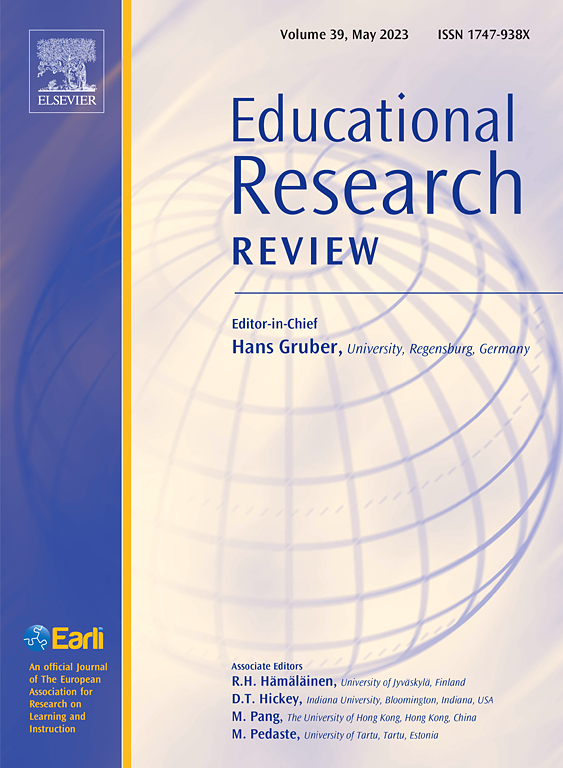Interdisciplinary knowledge diffusion of educational research, 2002–2021
IF 10.6
1区 教育学
Q1 EDUCATION & EDUCATIONAL RESEARCH
引用次数: 0
Abstract
Since considered as an independent discipline, education has become more interdisciplinary by absorbing insights from various disciplines. However, there is a gap in understanding how educational knowledge diffuses to other academic fields. Our study seeks to bridge this gap with three specific objectives: 1) Mapping the landscape of literature in the interdisciplinary knowledge diffusion process, 2) Investigating the characteristics of how educational knowledge has diffused to non-educational disciplines, and 3) Examining the non-educational topics that have referenced educational studies. We further delve into secondary disciplines within education for a more in-depth and comprehensive analysis. To achieve these aims, we reviewed primary educational literature published between 2002 and 2021 along with how these sources were cited in non-educational publications. The analysis was structured in three phases accordingly, including descriptive analysis, calculation of interdisciplinary knowledge diffusion metrics, and AI-assisted keyword identification. Our findings point to a growing interdisciplinary influence of education on other fields, as evidenced by various indicators such as the volume, distribution, breadth, diversity, and intensity of knowledge diffusion. The significance of our study lies in its novel research focus, the integration of quantitative and qualitative methodologies, and the extensive volume of publications covered.
教育研究的跨学科知识扩散,2002-2021
教育作为一门独立的学科,通过吸收各学科的见解,变得更加跨学科。然而,对教育知识如何向其他学术领域扩散的理解存在差距。我们的研究试图通过三个具体目标来弥合这一差距:1)绘制跨学科知识传播过程中的文学景观,2)调查教育知识如何扩散到非教育学科的特征,以及3)检查引用教育研究的非教育主题。我们进一步深入研究教育中的二级学科,以进行更深入和全面的分析。为了实现这些目标,我们回顾了2002年至2021年间发表的小学教育文献,以及这些文献如何在非教育出版物中被引用。分析分为三个阶段,包括描述性分析、跨学科知识扩散指标计算和人工智能辅助关键字识别。我们的研究结果表明,教育对其他领域的跨学科影响越来越大,正如知识传播的数量、分布、广度、多样性和强度等各种指标所证明的那样。本研究的意义在于其新颖的研究重点,定量和定性方法的结合,以及所涵盖的广泛出版物。
本文章由计算机程序翻译,如有差异,请以英文原文为准。
求助全文
约1分钟内获得全文
求助全文
来源期刊

Educational Research Review
EDUCATION & EDUCATIONAL RESEARCH-
CiteScore
19.40
自引率
0.90%
发文量
53
审稿时长
57 days
期刊介绍:
Educational Research Review is an international journal catering to researchers and diverse agencies keen on reviewing studies and theoretical papers in education at any level. The journal welcomes high-quality articles that address educational research problems through a review approach, encompassing thematic or methodological reviews and meta-analyses. With an inclusive scope, the journal does not limit itself to any specific age range and invites articles across various settings where learning and education take place, such as schools, corporate training, and both formal and informal educational environments.
 求助内容:
求助内容: 应助结果提醒方式:
应助结果提醒方式:


